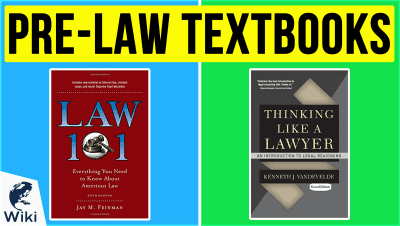5 Nonfiction Writers Telling Captivating Stories
Reading nonfiction is a great way to learn new things and see the world from different perspectives. The five authors listed here have penned fascinating works about everything from reading an encyclopedia cover to cover to coping with a loved one's brain tumor surgery. If you enjoy personal stories where people delve into issues that deeply affect their lives, these works belong on your shelf. This video was made with Ezvid Wikimaker.
Authors Who Write Captivating Nonfiction
5 Reasons To Read Non-Fiction
- You can learn interesting facts
- Reading helps improve concentration
- It can expand your vocabulary
- Gives you a chance to see things from new perspectives
- Reading can improve memory
Issues Faced By The LGBTQ+ Community
- Violent hate crimes
- Employment discrimination
- Parents who reject their LGBTQ+ children
- Bathrooms and other public accommodations being exclusionary
- Unequal healthcare
- Housing discrimination
- Criminal justice
- Everyday prejudice
Facts About Islam In America
- As of 2015, there were roughly 1.8 billion Muslims worldwide, about 24% of the total population
- By 2050, the number of Muslims worldwide is expected to equal the number of Christians
- There are between 3 and 4 million Muslims in the U.S., less than 2% of the population
- 41% of U.S. adults said they believe Islam encourages violence more than other faiths
- 92% of U.S. Muslims say they are proud to be American
- 55% say Americans are generally friendly to Muslims
- 53% of Jewish people said they had a favorable opinion of Muslims, compared to 39% of Catholics and 20% of white Evangelicals
- Jewish-Americans are also the most likely group to personally know an American Muslim (76%), compared to 53% of the general public
- 12% of Muslims said their religion should be a source of American law, compared to 5% of Catholics, 8% of Jews, 17% of Protestants and Evangelicals, and 9% of the general population
How To Analyze Nonfiction Texts
In Depth
There's no doubt that fiction is a powerful tool for telling riveting and enlightening stories, but sometimes the most compelling narratives are the ones that come straight from real life. The writers included here testify to this idea, drawing from history, politics, and their own experiences to present engrossing true stories. In no particular order, here are five writers using nonfiction to educate, excite, and inspire readers.
At #1 is A.J. Jacobs. A "New York Times"-bestselling author and self-proclaimed human guinea pig, Jacobs' books humorously mix science, memoir, and self-help. His first release, "The Know-It-All: One Man's Humble Quest to Become the Smartest Person in the World," is an account of the eighteen months he spent reading the Encyclopedia Britannica cover to cover. He continued his "One Man's Humble Quest" series with "The Year of Living Biblically," which charts his attempts to literally obey every rule in the Good Book, and concluded it with "Drop Dead Healthy," which narrates his mission to achieve perfect physical health.
Among Jacobs' other works is "It's All Relative: Adventures Up and Down the World's Family Tree," about innovations in genealogical research and their effects on how we think about history and humanity. On top of his books, Jacobs has written articles and essays for "The New York Times," "Entertainment Weekly," and "LinkedIn," and has done commentary on NPR's "Weekend Edition Saturday." He's also written crowdsourced advice columns for "Esquire," which drew upon the insights of his Facebook followers.
For #2 we have Julia McDermott, a multi-genre novelist who was compelled to write nonfiction after her youngest son, Jack, went through surgery to remove a brain tumor. The resulting memoir, "All the Above: My Son's Battle with Brain Cancer," recounts his struggle with the disease and the emotional toll it took on the family as they fought for his survival. The book, which also celebrates the impassioned medical professionals who helped Jack through to recovery, was a finalist for the Georgia Author of the Year Award in 2016.
A native of Dallas, Texas, McDermott grew up in Atlanta and graduated from the University of North Carolina at Chapel Hill. She spent a year in southern France as an exchange student, an experience that inspired her debut novel "Make That Deux." After choosing not to complete an MBA degree, she withdrew from the workforce, and was later commissioned to work on articles and website updates while raising her four children. It's when her kids began to leave home that she launched her career, eventually penning such suspense novels as "Daddy's Girl" and "Underwater."
Arriving at #3 is Paul Lisicky. With a candid, lyrical style frequently informed by his experiences as a queer man, Lisicky writes about a range of personal subjects including coming-of-age, desire, family, and loss. His first nonfiction book, "Famous Builder," is an autobiographical essay collection that explores selfhood through the lens of growing up. "The Narrow Door," which won multiple honors in 2016, paints a series of poetic vignettes inspired by Lisicky's long-term relationships with a female novelist and his poet ex-husband.
With a candid, lyrical style frequently informed by his experiences as a queer man, Lisicky writes about a range of personal subjects including coming-of-age, desire, family, and loss.
Alternately hopeful and heartrending, "Later: My Life at the Edge of the World" finds Lisicky reminiscing about his arrival in Provincetown, Massachusetts in the early 90s, where he sought escape from a history of family trauma. The author pays homage to the town's status as a queer haven where he was able to find acceptance and belonging. He also details how this initially utopian place was gradually ravaged by the AIDS epidemic, and how the community responded in the face of such devastation.
For #4 we get Steve Luxenberg, whose writing reflects his forty-year career as a newspaper editor and reporter. In 2009, he published his first book, "Annie's Ghosts: A Journey into a Family Secret," which investigates the history of a long-lost aunt who was erased from his genealogical records. His 2019 release, "Separate: The Story of Plessy v. Ferguson, and America's Journey from Slavery to Segregation," documents the titular Supreme Court case from the perspectives of those involved.
In addition to authoring books, Luxenberg is an associate editor at "The Washington Post," which he joined in 1985 as part of the investigative staff under Bob Woodward. After succeeding Woodward, he spent ten years as editor of the "Sunday Outlook" section, which produces original reporting on an array of political and cultural topics. Luxenberg lives in Baltimore with his wife, and frequently gives talks about his work and research methods at universities, conferences, and festivals.
Luxenberg lives in Baltimore with his wife, and frequently gives talks about his work and research methods at universities, conferences, and festivals.
Finally, coming in at #5 is Sabeeha Rehman. Born in Pakistan, Rehman emigrated to New York after an arranged marriage with a Pakistani doctor, and subsequently embarked on a decades-long career as a hospital administrator. Dispirited by the absence of a Muslim community in her area, and realizing that her sons knew almost nothing about their faith, she worked to help build a mosque on Staten Island. In 2014, she was encouraged to write a memoir about her experiences, which yielded the book "Threading My Prayer Rug."
With humor and warmth, Rehman's memoir chronicles her journey from a Pakistani Muslim to an American Muslim, illuminating the joys and hardships of being an immigrant in the United States. The author reveals her struggles with maintaining her identity and heritage while assimilating, as well as with negotiating the ever-present threat of Islamophobia. Spreading awareness beyond the book, Rehman has given hundreds of talks throughout the US on issues related to Islam and interfaith relations.



















